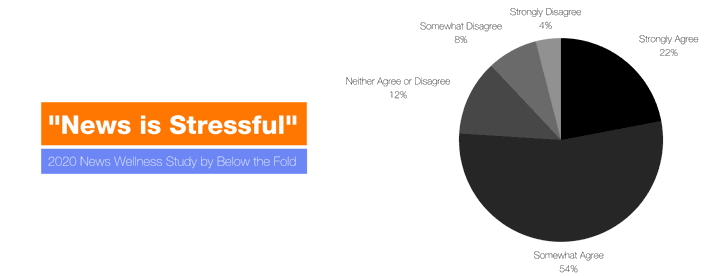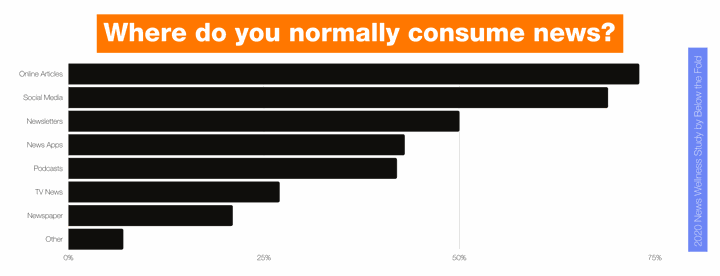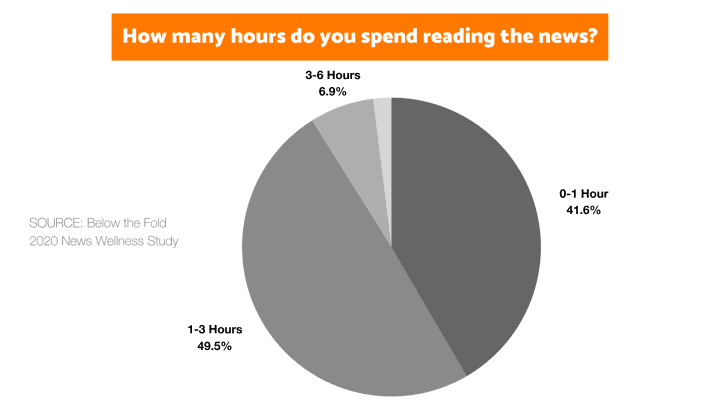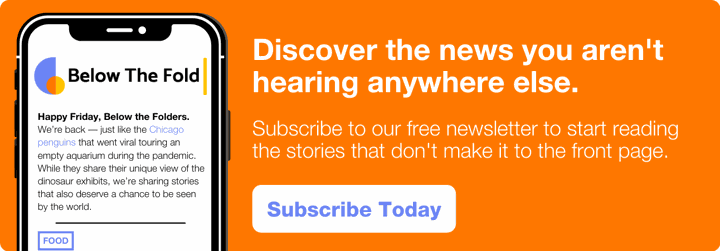We hear this question all the time: Is reading the news bad for you? From our perspective, it’s a loaded question.
While there’s news that helps guide decisions such as where we want to live or who we want to vote for, there’s also constant news about wars, civic unrest, failing economies, and violent events.
Whether we immediately recognize it or not, the media we consume impacts more than our understanding of the world; it influences our thinking, behavior, and emotions. This can lead to friction between news educating us versus stressing us.
In fact in 2017, a report from the American Psychological Association (APA) found that American adults felt a conflict between their desire to stay informed and their view of the media as a source of stress.
So, then how do create an ideal equilibrium? While we can’t promise an exact answer, we’ve built this guide on news wellness to help empower readers to build healthy news habits. Scroll through to hear what exactly news wellness is, insights from reports and our own news consumption survey, and resources on building your ideal news wellness.
(NOUN)
News wellness is the process of staying informed while balancing our emotional, psychological, and social well-being.
In fact, it's one of our four core values at Below the Fold. News wellness is a term we coined, we prioritize healthful news reading experiences, whether that's how we write, organize, or design.
News wasn’t always as stressful as it is today, and the 24-hour news cycle may be the first culprit of making it so.
At first, 24-hour reporting was quite novel in nature. Most attribute the beginning of this round-the-clock news cycle to CNN when they began live, constant reporting of the Gulf War. But soon, every network, news site, and beyond began reporting round-the-clock, leading to a deluge of content that is not only impossible to keep up with, but potentially draining in nature.In 2017, the American Psychological Association (APA) released a survey on “Stress in America.” The results revealed that while 95% of adults say they follow news regularly, but 56% say that doing so causes them stress.
We recently completed our first News Wellness Study, where we surveyed adult American news readers and found that not much has improved; if anything, it’s only gotten worse.
We found that 98% of adults agreed — either strongly (54%) or somewhat (23%) — that news is stressful. Despite this stress — 98% agreed, either strongly (73%) or somewhat (25%) — that it’s important to stay informed.
With 24-hour news networks and conversations with friends, family and other connections on social media, it’s hard to avoid the constant stream of stress around issues of national concern. These can range from mild, thought-provoking discussions to outright, intense bickering, and over the long term, conflict like this may have an impact on health. Understanding that we all still need to be informed about the news, it’s time to make it a priority to be thoughtful about how often and what type of media we consume.
Arthur C. Evans Jr, PhD, APA's CEO
The constant stream of news content is not only stressing us out, but exhausting us.
A 2020 report from Pew Research found that, for several years, Americans have been exhausted by the volume of news that exists. Specifically, 66% of Americans feel worn out by the amount of news there is.
So does this all mean we shouldn’t be reading news as much? Should we try to break free of 24-hour news? Interestingly enough, the Pew study found that news fatigue is less prevalent among active news readers. Specifically …
This fatigue can come from a variety of news topics, ranging from politics to natural disasters to shootings. This constant exhaustion can impact us quite strongly. Psychotherapist Susanne Babbei says that even exposure to events far away can feel like they’re happening in your backyard.
"Over time, when we experience this process again and again, our adrenal glands can become fatigued. Adrenal fatigue can lead to being tired in the morning, lack of restful sleep, anxiety and depression, as well as a multitude of other symptoms."
Susanne Babbei, Psychotherapist
Here at Below the Fold, we’ve heard how important consuming news is specifically from underrepresented communities. These groups have vocally expressed how events reported in the news directly impact their families, choices, and overall lives.
Yet, these groups aren’t the ones experiencing the highest levels of news fatigue. The same Pew study found that:
While it’s clear that news is causing exhaustion and stress, where is it really coming from? Let’s explore that next.
When comparing people’s general stress levels throughout the day to their stress levels when consuming news, our 2020 News Wellness Study found that stress levels increased when consuming news.
When asked to rate their stress levels throughout the day, the majority (25%) ranked stress at 5 out of 10. But then, when asked to rate their stress levels when consuming news, the majority (22%) ranked their stress at 8 out 10. Readers also noted how stressful they found news to be overall.
What is causing this stress? Beyond 24-hour news cycles, other culprits on our news wellness include constant consumption, negative news coverage, headline stress disorder, and the recent coronavirus pandemic.
One more time for the people in the back: A news cycle that is updated 24-hours a day and readily available wherever we are in the world can have a large impact on our mental health.
Health coach Suzy Glaskie says that because news is updated minute-by-minute, we feel the need to keep consuming it — even when there isn’t anything of substance being reported.
The psychological effects of “bad news” have existed for decades. Research from 1997 found that news broadcasts with a negative slant, in contrast to more neutral tones, make us more anxious and even sadder.
Meanwhile a study 2011 from the British Journal of Psychology revealed how watching negative news content showed increases in anxiety. Even further, negative news coverage can cause us to worry about issues in our own lives as well.
A 2014 study by the Media Insight Project found that, roughly, 6 in 10 people acknowledged they didn’t read past the news headline. Even just that headline can impact us through a concept called headline stress disorder.
Scroll down to learn more about this disorder.
First coined by PhD Steven Stosny in 2016, headline stress disorder can be defined as:
“For many people, continual alerts from news sources, blogs, social media, and alternative facts feel like missile explosions in a siege without end.”
Steve Stosny, Couples Therapist
Most recently, the coronavirus pandemic has led to a number of various mental health concerns. In our News Wellness Study, we learned a few things about American adults’ news reading habits around coronavirus.
We wanted more than the numerical data on this one, so we followed up to ask why their consumption is growing so much. Here’s what we heard.
"I need to stay up-to-date. I’m trying to get updates on death numbers, testing/vaccine information, and return to work plans."
"I have time to consume more information."
"I have more time available and the information serves as a point of discussion when trying to maintain virtual relationships."
"Lord knows what's going to happen or change and it's also like watching a train wreck, you can't look away."
"Overload on the same topics over and over. I’m getting sick and tired of no good news."
"I’m too stressed out by the constant covid coverage. I need a break."
"Sometimes it’s better not to know everything. It can be very distracting and lots of my friends have depressing days where they feel consumed by the news."
"It can get boring hearing about the same thing every day."
Meanwhile those whose consumption stayed the same mostly shared the same sentiments around how it’s always important to stay informed and abreast of what’s being covered.
From everything we’ve read, studied, and learned so far it’s clear that despite feeling stressed because of reading the news, we recognize that we do need to read the news. In fact, being a less active reader of news can even cause more stress.
So then how do we balance the two and create our own news wellness? We asked journalists, mental health experts, and even our own team members at Below the Fold and found various habits that are worth exploring. Keep in mind that your own ideal news wellness will come from trying various practices and seeing what works for you.
With that, let’s explore seven tips that came from these various conversations.
There are more ways to consume news today than ever before. This is a good thing, as it allows us to understand the medium most-suited to our own well-being. For example, some people are triggered by visuals, so TV broadcasts could be more harmful than beneficial as a medium for consuming news information. Others are impatient listening to radio or podcasts, which can create an uneasiness; digital or print articles can be more beneficial in these cases where you can control the pace at which you consume.
There are likely many factors, so experimenting with what is ideal for you is worth investing time in and determining the mediums you’ll most often turn to.
We’ve already heard time and time again how constant, 24-hour news can be damaging to our mental health. While many articles recommend designating periods of time where you consciously unplug, we recommend being conscious about when you do plug in.
For many, catching up on news as soon as you wake up is an impulse reaction. Starting your day with potentially negative headlines could negatively impact your mood for the remainder of the day. At the same time, ending your day with potentially negative news could disturb your sleep. Test out different times of day and commit to the ones that leave you the least stressed out after.
Our 2020 News Wellness Study found that the majority of adults consume news up to three hours a day.
When there’s a major negative event in the news, whether the latest school shooting, a drop in the economy, or the recent coronavirus pandemic… it naturally overtakes social conversations. There’s two ways to actively take control of these conversation
Lean in to the social chatter.
For some people, learning about updates and discussing mainstream news topics with family and friends can be a healthy way to consume new information without having to actively follow mainstream headlines.
In this way, you rely on your network to let you know of major developments.
"This social part, to me (even as an introvert), is the most important part of my news wellness. It forces me to hear what I'm thinking and evaluate myself by comparing my takeaways and opinions with others'. And, it brings me closer to those that discuss these stories with me as I learn more about them and how their lives have shaped their perspectives."
Vivian Diep, Below the Fold Co-Founder
Lean out to the social chatter.
For others, constantly talking about what’s happening can be overwhelming.This was even more true in 2020.
Clinician Sabeen Ahmed shared how she removed herself from Zoom hangouts when COVID-19 dominates the discussion, believing it’s important to have to strict boundaries.
"When others make predictions about how long the virus will last or its impact on the economy, discuss the current death toll or the daily news, is easy to get sucked into the void of negativity. While it’s important to have a realistic and cautious outlook on what’s happening, too much news or constant COVID talk can take an unhealthy toll on us."
Sabeen Ahmed, Clinician
Overall, it’s clear that whether you’re leaning in or out of the conversation, it’s about understanding what boundaries make sense for you if discussing the news is or isn’t ideal for your own news wellness.
The conflict between speed of publishing and accuracy of reporting has escalated, which can lead to unintended misinformation. And in situations such as the pandemic, information is constantly changing. How do we practice news literacy in this reporting landscape? The Center for News Literacy recommends:
By purely paying attention to headline news, you may end up among those suffering from high levels of news fatigue. One of the most popular ways we’ve seen news diets vary lately are through podcasts and newsletters.
Here at Below the Fold, we publish a newsletter focused on surfacing news you aren't hearing anywhere else. We've heard how it's a refreshing read for subscribers, and take pride in providing healthful news experiences.
With all that’s happening in the world, finding an outlet to discuss, vent, or process it is always a valuable option. APA has an extensive guide on finding a good therapist for those interested.
Don’t want a full-time therapist but still want to learn from them? There are a number of social media accounts run by therapists and mental health experts that can help infuse positivity into your day. Just as our social feeds can damage our well-being, we can also revamp them to benefit our well-being.
Of course, the best practices of managing your health and wellness apply to managing your news wellness as well. This includes:
Beyond the tips, we wanted to share resources and tools that can empower you to strengthen your own news wellness. At the top of the list, of course, is our own newsletter.
We hope you invest time into practicing what works best for you.









